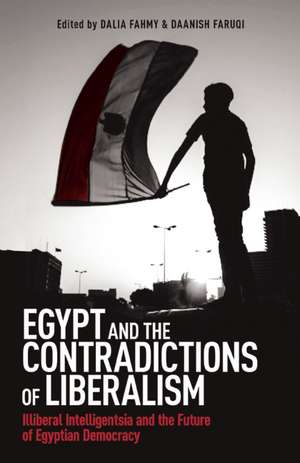Egypt and the Contradictions of Liberalism: Illiberal Intelligentsia and the Future of Egyptian Democracy: Oneworld Academic
Editat de Dalia Fahmy, Daanish Faruqien Limba Engleză Paperback – 8 noi 2016
Two years after the Arab Spring had transformed Egypt from a dictatorship under Hosni Mubarak to a democracy under the Muslim Brotherhood, there was a military coup that saw the country return being a police state. In a paradoxical turn of events, this move away from liberalism was aided by the same influential coterie of Egyptian intellectuals and activists who had previously been leaders of civic protest under Mubarak.
With contributions from experts in Middle East studies, political science, philosophy, Islamic studies, and law, amongst others, this volume represents the first thorough examination of how Egypt's liberal intellectuals emboldened the return of authoritarianism. Together they form a holistic study of liberalism and modern Egypt, addressing the restrictions placed upon liberal opposition by the structural contours of the state itself, the role of Islam and Islamic activism, as well as issues of secularism, feminism and human rights more broadly following the overthrowing of Egypt’s first democratically-elected president.
With contributions from experts in Middle East studies, political science, philosophy, Islamic studies, and law, amongst others, this volume represents the first thorough examination of how Egypt's liberal intellectuals emboldened the return of authoritarianism. Together they form a holistic study of liberalism and modern Egypt, addressing the restrictions placed upon liberal opposition by the structural contours of the state itself, the role of Islam and Islamic activism, as well as issues of secularism, feminism and human rights more broadly following the overthrowing of Egypt’s first democratically-elected president.
Din seria Oneworld Academic
-
 Preț: 153.05 lei
Preț: 153.05 lei -
 Preț: 152.62 lei
Preț: 152.62 lei -
 Preț: 137.14 lei
Preț: 137.14 lei -
 Preț: 153.05 lei
Preț: 153.05 lei -
 Preț: 153.47 lei
Preț: 153.47 lei - 7%
 Preț: 72.56 lei
Preț: 72.56 lei -
 Preț: 263.63 lei
Preț: 263.63 lei
Preț: 191.80 lei
Preț vechi: 207.66 lei
-8% Nou
Puncte Express: 288
Preț estimativ în valută:
36.71€ • 38.18$ • 30.30£
36.71€ • 38.18$ • 30.30£
Carte disponibilă
Livrare economică 24 martie-07 aprilie
Livrare express 08-14 martie pentru 46.98 lei
Preluare comenzi: 021 569.72.76
Specificații
ISBN-13: 9781780748825
ISBN-10: 1780748825
Pagini: 416
Dimensiuni: 146 x 226 x 29 mm
Greutate: 0.48 kg
Editura: Oneworld Publications
Colecția Oneworld Publications
Seria Oneworld Academic
ISBN-10: 1780748825
Pagini: 416
Dimensiuni: 146 x 226 x 29 mm
Greutate: 0.48 kg
Editura: Oneworld Publications
Colecția Oneworld Publications
Seria Oneworld Academic
Recenzii
"A fiercely radical constellation of critical thinking indispensable for our understanding not just of Egypt...but in fact the very legacy of liberalism in the 21st century."
—Hamid Dabashi, Hagop Kevorkian professor of Iranian Studies and Comparative Literature, Columbia University
"An extraordinary and wide-ranging exploration of the Arab spring's excitement and reversal in Egypt."—Ebrahim Moosa, professor of Islamic Studies, Keough School of Global Affairs, University of Notre Dame
"The question of democracy in Muslim societies has generated heated debate on the role of mainstream Islamist parties and democratization. Can they moderate their views? Will they respect electoral outcomes? Are they committed to political pluralism? The same questions, however, have been rarely asked of liberal and secular forces who occupy the same political space. This is precisely what is unique about this book. Focusing on Egypt's Arab Spring democratic transition, it examines the political behavior of Egyptian liberals during the transition period and after the 2013 military coup. In doing so, the editors and contributors make an important and exceptional contribution to understanding both the persistence of authoritarianism in the Arab-Islamic world and the obstacles to democracy. It is a must read volume that challenges stereotypes and deepens our grasp of the politics and societies of the Middle East."
— Nader Hashemi, director of the Center for Middle East Studies, University of Denver, and author of Islam, Secularism, and Liberal Democracy: Toward a Democratic Theory for Muslim Societies
—Hamid Dabashi, Hagop Kevorkian professor of Iranian Studies and Comparative Literature, Columbia University
"An extraordinary and wide-ranging exploration of the Arab spring's excitement and reversal in Egypt."—Ebrahim Moosa, professor of Islamic Studies, Keough School of Global Affairs, University of Notre Dame
"The question of democracy in Muslim societies has generated heated debate on the role of mainstream Islamist parties and democratization. Can they moderate their views? Will they respect electoral outcomes? Are they committed to political pluralism? The same questions, however, have been rarely asked of liberal and secular forces who occupy the same political space. This is precisely what is unique about this book. Focusing on Egypt's Arab Spring democratic transition, it examines the political behavior of Egyptian liberals during the transition period and after the 2013 military coup. In doing so, the editors and contributors make an important and exceptional contribution to understanding both the persistence of authoritarianism in the Arab-Islamic world and the obstacles to democracy. It is a must read volume that challenges stereotypes and deepens our grasp of the politics and societies of the Middle East."
— Nader Hashemi, director of the Center for Middle East Studies, University of Denver, and author of Islam, Secularism, and Liberal Democracy: Toward a Democratic Theory for Muslim Societies
Cuprins
1 Egyptian liberals, from revolution to counterrevolution | Daanish Faruqi and Dalia F. Fahmy
Introduction
The genealogies of Egyptian liberalism
Structure of the argument
Conclusion: Is liberalism contradictory?
SECTION I: LIBERALISM AND THE EGYPTIAN STATE
2 Egypt's structural illiberalism: How a weak party system undermines participatory politics | Dalia F. Fahmy
The party system in Egypt
Elections in Egypt and why they matter
The parliament as a site of contestation
Political parties after the revolution: A liberal possibility
Participatory politics under SCAF and the rise of the Muslim Brotherhood
The 2015 parliament: The political consolidation of authoritarian rule
Conclusion
3 Nasser's comrades and Sadat's brothers: Institutional legacies and the downfall of the Second Egyptian Republic | Hesham Sallam
The failure of contingent consent
Institutional legacies and the limitations of agency-centered narratives
The origins of the political field
Conclusion
4 (De)liberalizing judicial independence in Egypt | Sahar F. Aziz
The three prongs of liberalism: Private, political, and legal liberty
The liberal roots of Egypt's judiciary
Incremental deliberalization in the Mubarak era
A counterrevolution in the courts
Conclusion
SECTION II: LIBERALISM AND EGYPTIAN CIVIL SOCIETY
5 The authoritarian state's power over civil society | Ann M. Lesch
The structures of authoritarianism
The post-25 January military regime
Mohammad Morsi's contradictory policies
General Sisi's constriction of the public space
The consolidation of authoritarian control
6 Myth or reality?: The discursive construction of the Muslim Brotherhood in Egypt | Mohamad Elmasry
The Egyptian press system
Disloyal to Egypt
Anti-revolutionary
Conclusion
7 Student political activism in democratizing Egypt | Abdel-Fattah Mady
Introduction
Emergence of Egypt's student movement
Student activism under Nasser
Student activism during Sadat's era
Student activism during Mubarak's era
Post-January 25, 2011 revolution
Conclusion
SECTION III: ISLAM, SECULARISM, AND THE STATE
8 Egypt's secularized intelligentsia and the guardians of truth | Khaled Abou El Fadl
9 The truncated debate: Egyptian liberals, Islamists, and ideological statism | Ahmed Abdel Meguid and Daanish Faruqi
Introduction
Liberals and the state: Authoritarian modernism
Islamists and the state: The modernist paradox
Conclusion: Post-Islamism and post-liberalism as post-statism
SECTION IV: EGYPTIAN LIBERALS IN COMPARATIVE PERSPECTIVE POST-2013
10 Conflict and reconciliation: "Arab liberalism" in Syria and Egypt | Emran El-Badawi
Introduction
State advocacy and the beginnings of Arab liberalism
Activism and state opposition: The later development of Arab liberalism
Egypt and Syria no more
Silencing liberal activism in Egypt, ca. 1979?2013
Activists in conflict and artists in reconciliation, Egypt, ca. 2013?
Temporary reconciliation with Assad, Syrian intellectuals, ca. 1982?2012
Conflict, exile and civil war: Liberal activism in Syria, ca. 2000?12
Burhan Ghalioun and Gaber Asfour, ca. 1990?2010
The Arab uprisings, 2011
Ghalioun and the SNC, 2011?12
Asfour, the ministry and Egypt's return to military rule, 2011?14
Rabaa
The limits of Arab liberalism
11 Egypt's new liberal crisis | Joel Gordon
Heroes of the revolution
The liberal crisis reconsidered
Postscript: Five years on
12 Egyptian liberals and their anti-democratic deceptions: A contemporary sad narrative | Amr Hamzawy
Liberal ideas at a crossroads
Grand deception one ? Sequentialism
Grand deception two ? Nothing is more important than…
Grand deception three ? The notion of national necessity
Grand deception four ? Religion and politics
Grand deception five ? The state above everyone and everything
Concluding remarks ? Fascist techniques stepped up
Conclusion: Does liberalism have a future in Egypt? | Emad El-Din Shahin
A liberal legacy
New beginnings
About the contributors
Index
Introduction
The genealogies of Egyptian liberalism
Structure of the argument
Conclusion: Is liberalism contradictory?
SECTION I: LIBERALISM AND THE EGYPTIAN STATE
2 Egypt's structural illiberalism: How a weak party system undermines participatory politics | Dalia F. Fahmy
The party system in Egypt
Elections in Egypt and why they matter
The parliament as a site of contestation
Political parties after the revolution: A liberal possibility
Participatory politics under SCAF and the rise of the Muslim Brotherhood
The 2015 parliament: The political consolidation of authoritarian rule
Conclusion
3 Nasser's comrades and Sadat's brothers: Institutional legacies and the downfall of the Second Egyptian Republic | Hesham Sallam
The failure of contingent consent
Institutional legacies and the limitations of agency-centered narratives
The origins of the political field
Conclusion
4 (De)liberalizing judicial independence in Egypt | Sahar F. Aziz
The three prongs of liberalism: Private, political, and legal liberty
The liberal roots of Egypt's judiciary
Incremental deliberalization in the Mubarak era
A counterrevolution in the courts
Conclusion
SECTION II: LIBERALISM AND EGYPTIAN CIVIL SOCIETY
5 The authoritarian state's power over civil society | Ann M. Lesch
The structures of authoritarianism
The post-25 January military regime
Mohammad Morsi's contradictory policies
General Sisi's constriction of the public space
The consolidation of authoritarian control
6 Myth or reality?: The discursive construction of the Muslim Brotherhood in Egypt | Mohamad Elmasry
The Egyptian press system
Disloyal to Egypt
Anti-revolutionary
Conclusion
7 Student political activism in democratizing Egypt | Abdel-Fattah Mady
Introduction
Emergence of Egypt's student movement
Student activism under Nasser
Student activism during Sadat's era
Student activism during Mubarak's era
Post-January 25, 2011 revolution
Conclusion
SECTION III: ISLAM, SECULARISM, AND THE STATE
8 Egypt's secularized intelligentsia and the guardians of truth | Khaled Abou El Fadl
9 The truncated debate: Egyptian liberals, Islamists, and ideological statism | Ahmed Abdel Meguid and Daanish Faruqi
Introduction
Liberals and the state: Authoritarian modernism
Islamists and the state: The modernist paradox
Conclusion: Post-Islamism and post-liberalism as post-statism
SECTION IV: EGYPTIAN LIBERALS IN COMPARATIVE PERSPECTIVE POST-2013
10 Conflict and reconciliation: "Arab liberalism" in Syria and Egypt | Emran El-Badawi
Introduction
State advocacy and the beginnings of Arab liberalism
Activism and state opposition: The later development of Arab liberalism
Egypt and Syria no more
Silencing liberal activism in Egypt, ca. 1979?2013
Activists in conflict and artists in reconciliation, Egypt, ca. 2013?
Temporary reconciliation with Assad, Syrian intellectuals, ca. 1982?2012
Conflict, exile and civil war: Liberal activism in Syria, ca. 2000?12
Burhan Ghalioun and Gaber Asfour, ca. 1990?2010
The Arab uprisings, 2011
Ghalioun and the SNC, 2011?12
Asfour, the ministry and Egypt's return to military rule, 2011?14
Rabaa
The limits of Arab liberalism
11 Egypt's new liberal crisis | Joel Gordon
Heroes of the revolution
The liberal crisis reconsidered
Postscript: Five years on
12 Egyptian liberals and their anti-democratic deceptions: A contemporary sad narrative | Amr Hamzawy
Liberal ideas at a crossroads
Grand deception one ? Sequentialism
Grand deception two ? Nothing is more important than…
Grand deception three ? The notion of national necessity
Grand deception four ? Religion and politics
Grand deception five ? The state above everyone and everything
Concluding remarks ? Fascist techniques stepped up
Conclusion: Does liberalism have a future in Egypt? | Emad El-Din Shahin
A liberal legacy
New beginnings
About the contributors
Index









